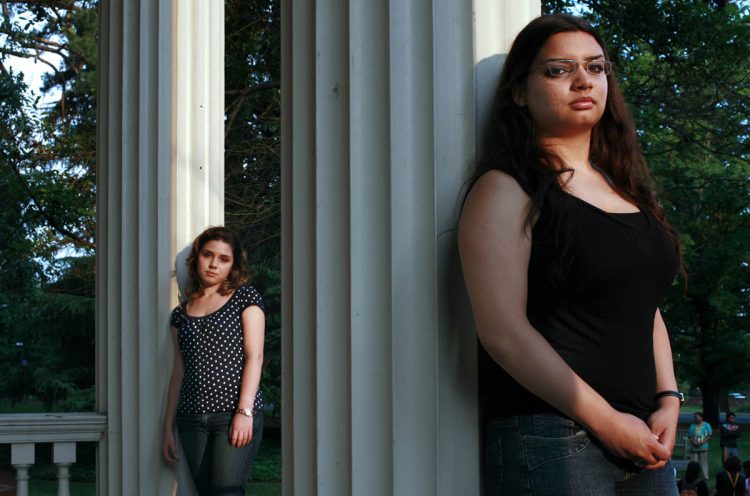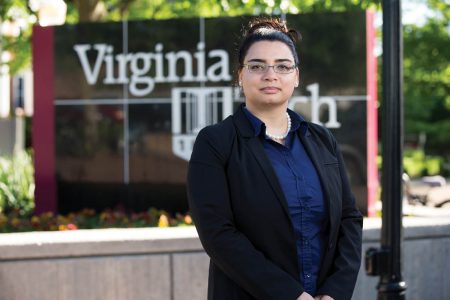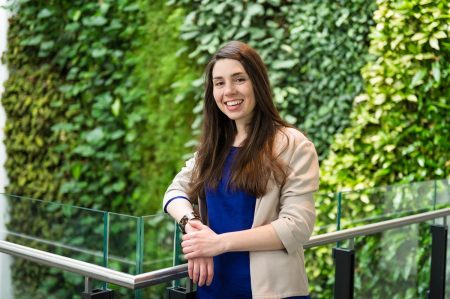A World Apart: Two refugees find friendship, sense of home during college years

This photo of Matea Osti ’08 (left) and Marwa Abdel Latif ’09 ran in the New York Times in 2006.
(Credit: Josh Meltzer/The New York Times/Redux)
Two refugees find friendship, sense of home during college years
It was a cold January day in 2005, when a new international student sat down at the same table as Matea Osti ’08 in the College dining hall. Osti had noticed her a few days before, huddled in her winter coat while inside one of the residence halls. Marwa Abdel Latif ’09 had just arrived at the College from Lebanon and was trying hard to get used to the cold Virginia winter weather.
Over lunch, the two struck up a conversation, joined by another student from Croatia. The talk turned to a discussion on war, and Osti and Abdel Latif discovered a connection they never expected to find—they were both refugees.
Their circumstances were vastly different—Abdel Latif was a Palestinian refugee who was born in Lebanon, and Osti fled Bosnia when she was five with her mother. Yet the similarities soon helped the two young women forge what would become a lasting friendship.
“Our experiences as refugees definitely were not identical by any means,” Abdel Latif said. “However, we bonded over the fundamental concept of not choosing the environment you were born in.”
The two friends shared much during their college years. Abdel Latif taught Osti to belly dance, while Osti taught Abdel Latif how to play some songs on the piano. When other students returned home on breaks and for the summer, the young women stayed behind, their friendship dispelling the loneliness.
Their story drew the attention of a New York Times columnist, who came to campus and wrote a column on the friendship that was published in the summer of 2006.
“Marwa and I clicked the moment we met,” Osti remembered. “It was reassuring to have someone next to me who understood what it meant to have had a childhood impacted by war. But we also laughed, listened to music, and studied together. We held each other up through the difficult times and celebrated the good times together.”
Though they now live a world apart, Osti and Abdel Latif remain close friends. Read on to learn more about their journeys after leaving the Red Brick Wall.
Finding Home: The Story of Marwa Abdel Latif ’09
Like so many others in Lebanon, Marwa Abdel Latif ’09 grew up in a home without a home. Though she was born in Lebanon, Abdel Latif’s grandparents were Palestinian refugees forced to leave everything they knew and owned during the Israeli war of independence.
“You are raised with an identity that is considered a blessing, but yet a curse,” she said. “It is a blessing for being a survivor of historical misfortunes and mistreatment, and it is curse as you are not allowed to have rights such as jobs, education, ownership, social, medical, and financial assistance.”

Marwa Abdel Latif ’09 earned a Ph.D. from Virginia Tech this spring and now holds several positions in its Macromolecules Innovation Institute.
The second eldest of seven children, Abdel Latif lived in a two–bedroom apartment with her family in Beirut. She remembers first becoming aware of her Palestinian origins as a young child, when she had to switch from a private elementary school to the UNRWA refugee school.
“I recall nights I would ask my dad to send me back,” she said, remembering how three or four students shared each desk, and insufficient lighting hurt her eyes and kept her from seeing the board. “I just recall them saying that you are Palestinians, and your education is all you have to survive. You are smart and capable, but you must endure.”
Abdel Latif took them at their word. She worked hard, and fortunately, had parents who valued education. While in high school, Abdel Latif secured a scholarship to a top Lebanon university, but she knew the cost to her family—even with the assistance—would be too high. She later learned that she was chosen for a scholarship to attend a U.S. college after another family refused to send their daughter; her community frowned upon young women
being sent alone anywhere, especially America, without male protection. With her mom’s help, Abdel Latif convinced her father to sign the papers that would ultimately change her life.
At 17, Abdel Latif pushed away her fear and traveled across the world to Lynchburg, Virginia, to a college she had never visited in person. Alone, unsure of the language, and confused by an entirely different culture, she made the decision to embrace this opportunity wholeheartedly—pitfalls, challenges, and all.
“Every day was a new experience,” she remembered. “A sense of fragility and doubt always shrouded me. I was unsure if I would be able to perform academically, especially given the language barrier. I didn’t know what to expect.”
She remembers how difficult the first months were, as she adapted to tough classes, new technology, and the difficulty she had understanding what even her roommate was saying. However, she also remembers the warm welcome and intense support she received from professors, administration, and classmates.
After graduating from the College with a B.S. degree in biology and a B.A. degree in chemistry, Abdel Latif attended Virginia Tech, where she earned her Ph.D. last year. Now married, she currently holds several positions in the Macromolecules Innovation Institute at Virginia Tech, including outreach administrator. She plans to pursue post–doctoral positions for industrial companies and national laboratories, but her dream job would be to serve as a United Nations ambassador for education, assisting the underprivileged advance their education.
Always grateful for the support she had to attend both Randolph and Virginia Tech, Abdel Latif has made it a lifelong goal to always give back to the communities she is in.
“The scholarship that I was provided by Randolph College has allowed me to become the person I am today,” she said, adding that the moral support she received at both of her schools was equally as important.
During graduate school, Abdel Latif was active academically and with her volunteer time, serving on numerous boards, organizations, and projects. For three years, she has worked on initiating a refugees program at the United Nations Relief and Work Agency for Palestinian Refugees/Lebanon, which provides ways to help refugees in Lebanon better understand applications of science as well as to provide the teachers there with improved skills and practical science experiments.
Her service and teaching talents were recognized when she was nominated for two of the university’s highest awards for graduate students in 2013–14. She received the Virginia Tech Graduate Student Award for Excellence in Teaching and was awarded honorary mention for the Virginia Tech Service Excellence Award.
Abdel Latif is now a green card holder and hopes to soon begin the process of obtaining citizenship to her adopted home. “The day I received my green card, it felt amazing,” she said. “It was the first time that I felt I officially existed. I had earned my right to work and have ownership of some kind. I cannot vote, but I can be treated as any other member of the society. I am not citizenship–less in legal terms at least. I have rights, and there is a country willing to stand for me legally and that expects me to become a productive and contributing member instead of an ‘unplanned for’ visitor or a burden. It is a privilege for any citizen of any nation, even if they are citizens by birth.”
As she watches the turmoil taking place in the world and even in the United States regarding immigration and refugees, Abdel Latif has felt a range of emotions. She made a rare visit to see her family in Lebanon in January, arriving back in the United States just days before the President signed the travel ban executive order.
“What most people don’t realize is that we are not refugees because we wanted it for ourselves,” she said. “Refugees are a result of political ferment, where the people involved in the ravage have everything to lose. I was in the same boat, and so I learned to seize every opportunity thrown at me and become empowered.”
As she gets older and faces more and more challenges in her life, she finds herself remembering a phrase her father often shared. “He used to say, ‘The true beauty in an art piece is its imperfections, so I wish you imperfections as you grow, and they shall make you unique.’ For some reason, it has made more sense as I grow older.
“I was one of the luckiest to have been given what others around the world wish they had,” she added. “I have realized that with each opportunity comes a responsibility and the greater the opportunity, the more enormous the responsibility to others and the community. No matter the difficulties I see myself or others face, I can just recall the laughter and the fact that the hardship will pass.”
A Life Changed By War: The Story of Matea Osti ’08
When Matea Osti ’08 was 5, her mother packed just a few precious belongings, grabbed her hand, and left Doboj, her Bosnian hometown. Word was spreading that war was nearing, and Osti’s mother did not want to take any chances.

Matea Osti ’08 at work in the David Attenborough Building in Cambridge, UK. (Photo by Cheryl-Samantha Owen, www.samowenphotography.com)
“Looking back at the situation now, as an adult, I see the courage and bravery it took my mum to just leave everything—our lives, our family, and our friends, and walk into the unknown,” Osti said.
Several weeks after the pair escaped, Osti learned that her mother’s instinct was right; the war had reached Doboj. Her mother’s quick thinking most likely saved their lives.
Osti and her mother first escaped through Croatia and Slovenia, and then to refugee camps in Austria where a year later they were reunited with her father and grandmother. The family was eventually able to settle in New Zealand. “Each new place came with a new language, a new culture, a new reality,” Osti remembers.
Osti and her family later became citizens of New Zealand, and she counts herself lucky. However, the memories of her nomadic childhood sometimes resurface, especially in light of current refugee crisis, like that in Syria.
“Personally, it’s an unsettling reality to swallow, that the world now contains the highest number of displaced persons since global records began—some 65 million people in 2015, according to the United Nations Refugee Agency,” Osti said. “My own experience as a refugee was not on the same order of magnitude as the current crisis in Syria. It’s heartbreaking seeing how ordinary people’s lives are being affected.”
It was through connections her family’s employer had with friends in Lynchburg that led to Osti’s eventual journey to the United States, and to Randolph, then called Randolph–Macon Woman’s College.
“My years in college were supported by scholarships from Randolph College and many local Lynchburg residents who saw a student with potential and decided to give her a helping hand. Their acts of kindness literally changed my life.”
It was at Randolph, where she began school in 2004, that she discovered her passion for global and environmental studies. She ended up majoring in both.
Navigating college while also adapting to a new country and culture was not easy. But she loved her new home. “I remember the immaculate College lawns, pumpkin pie, the enormity of Walmart,” she said. “I remember the sweet scent of ‘opportunity’ that America is so well known for. It was something I relished and embraced.”
After graduation, Osti began her master’s degree in environmental change and management at the University of Oxford. After earning that degree, she moved to her current home in Cambridge and started working for an environmental organization on international climate change and biodiversity policy. In 2015, she started work for the International Union for Conservation of Nature (IUCN), the world’s largest global environmental network. Here, she serves in the World Heritage Programme, where she is part of a project to generate knowledge and data on natural World Heritage-designated sites, like the Grand Canyon and the Galapagos.
At a recent United Nations conference on knowledge and development, Osti was reminded just how significant her childhood and college experiences were to her career and life success. The professor challenged the audience to think back to the first place where they were taught not what to think, but how to think.
“For me, that place was Randolph,” she said. “It was there that I learned to take an idea or concept, turn it on its head, really shake it up and explore it from multiple angles to find where the solutions lie,” she said.
Nearly 10 years since her graduation, Osti still asks a lot of questions and tries to fit learning into her everyday life. And she sometimes thinks back to her childhood and how it shaped her life.
“It’s an experience that stays with you for life,” she said. “It reminds you that life is precious. It reminds you that freedom, safety, and stability are not to be taken for granted.”
Tags: alumnae, biology, chemistry, environmental studies, global studies, international students, magazine, outcomes, quotables-globalstudies, quotables-international, refugee, Vita Vol. 1 No. 1
